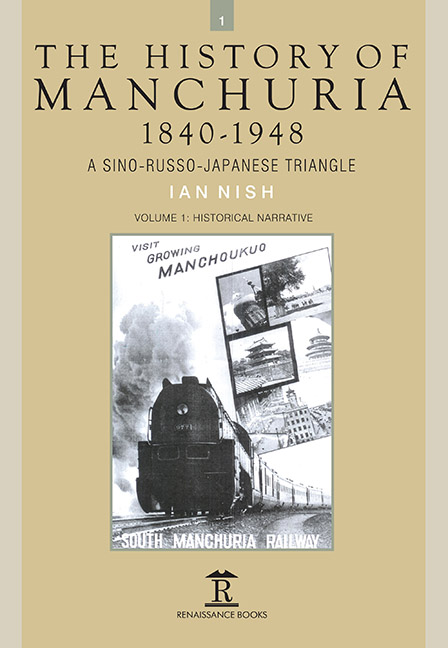Book contents
- Frontmatter
- Dedication
- Contents
- Preface
- Acknowledgements
- Name Conventions
- List of Abbreviations
- List of Maps
- Chapter One Manchuria and Russian Ambition, 1840s–1890s
- Chapter Two Sino-Japanese War and After, 1894–1900
- Chapter Three Prelude to the Russo-Japanese War, 1900–1905
- Chapter Four Railways, Reforms and Revolutions, 1906–1914
- Chapter Five Wartime Turmoil in Manchuria, 1915–1922
- Chapter Six Chang Tso-Lin’s Manchuria, 1922–28
- Chapter Seven Chinese Nationalism and Foreign Railways, 1929–1931
- Chapter Eight Lytton Commission in Manchuria, 1931–1932
- Chapter Nine Manchukuo: From Republic to Empire, 1933–1937
- Chapter Ten A Decade of Wars, 1938–1948
- Epilogue
- Map
- Select Bibliography
- Index
- Volume 2: Select Primary Sources
- Miscellaneous Frontmatter
- Dedication
- Miscellaneous Frontmatter
- Chapter 1 1840–1894
- Chapter 2 1895–1899
- Chapter 3 1900–1905
- Chapter 4 1905–1914
- Chapter 5 1915–1922
- Chapter 6 1922–1928
- Chapter 7 1929–1931
- Chapter 8 1931–1932
- Chapter 9 1933–1937
- Chapter 10 1938–1948
- Apendix Appeal by the Chinese Government
Chapter 7 - 1929–1931
Published online by Cambridge University Press: 18 November 2023
- Frontmatter
- Dedication
- Contents
- Preface
- Acknowledgements
- Name Conventions
- List of Abbreviations
- List of Maps
- Chapter One Manchuria and Russian Ambition, 1840s–1890s
- Chapter Two Sino-Japanese War and After, 1894–1900
- Chapter Three Prelude to the Russo-Japanese War, 1900–1905
- Chapter Four Railways, Reforms and Revolutions, 1906–1914
- Chapter Five Wartime Turmoil in Manchuria, 1915–1922
- Chapter Six Chang Tso-Lin’s Manchuria, 1922–28
- Chapter Seven Chinese Nationalism and Foreign Railways, 1929–1931
- Chapter Eight Lytton Commission in Manchuria, 1931–1932
- Chapter Nine Manchukuo: From Republic to Empire, 1933–1937
- Chapter Ten A Decade of Wars, 1938–1948
- Epilogue
- Map
- Select Bibliography
- Index
- Volume 2: Select Primary Sources
- Miscellaneous Frontmatter
- Dedication
- Miscellaneous Frontmatter
- Chapter 1 1840–1894
- Chapter 2 1895–1899
- Chapter 3 1900–1905
- Chapter 4 1905–1914
- Chapter 5 1915–1922
- Chapter 6 1922–1928
- Chapter 7 1929–1931
- Chapter 8 1931–1932
- Chapter 9 1933–1937
- Chapter 10 1938–1948
- Apendix Appeal by the Chinese Government
Summary
George Moss (Foochow) to Sir John Pratt (London), 12 March 1929
…I WISH YOU were anywhere in China today, preferably in Foochow for it is a lovely spring day and I would take you for a walk around the Chinese town and ask you, si monumentum requeris circumspice. (1)
It is today Sun Yat-sen’s Death Anniversary, and a public holiday on which by Decree there is to be no marrying or burying, no drinking of wine, games or jollification ‘for the work of the late revered leader is not yet accomplished’. Although most of the shops are, after the manner of Chinese, half-opened, as no decree is ever obeyed. Literally in this Country the solemn holiday is being observed by high and low, and municipal ceremonies and processions are taking place in Foochow today. Open flouting of the Decree would bring swift and public retribution, probably in the shape of a looted shop and a forlorn figure smeared with tar and wearing a dunce’s cap stumbling along with hands tied behind the back in the midst of a tawdry and tired procession of boys and girls and trade unionists, urged along by hard-visaged professional politicians shouting slogans through megaphones for the crowd to shout back through the blare of a brass band trying to play ‘Frere Jacques’ or ‘There is a Tavern’ or ‘Marching through Georgia’… [Text uncertain]
The point of all this is that you would see the new Chinese, a people consciously controlled and organized and prepared deliberately to demonstrate for or against anything as their Masters of the Kuomintang order. But they are no longer demonstrating against Britain and the British Empire, towards which their leaders have openly professed some degree of amity. Japanese and Communists are the popular enemies at present. But hate and attack somebody they must; they must also glorify their late leader; their attention must be deflected from their own miseries, otherwise they would turn and rend each other. It still would not take much to turn them again against us. But every day we pass in amity and every occasion which leads their masters to affirm official friendship with us makes a revulsion to mass hatred harder to contemplate.
- Type
- Chapter
- Information
- The History of Manchuria, 1840-1948A Sino-Russo-Japanese Triangle, pp. 97 - 103Publisher: Amsterdam University PressPrint publication year: 2016

